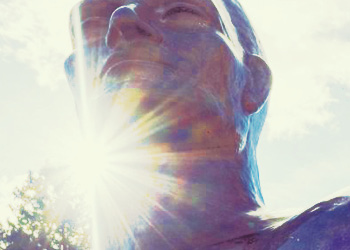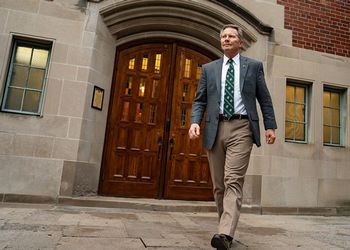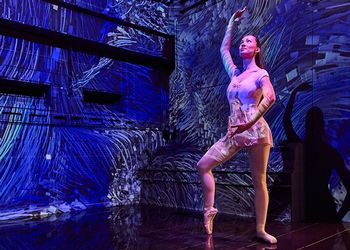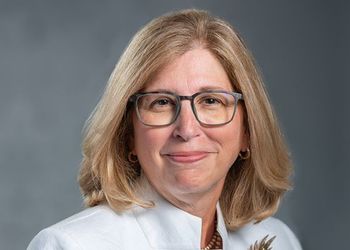Residential Colleges Offer an Array of Choices

Since their advent, residential colleges have offered students many options in living and learning opportunities that dramatically enhance their MSU experience.
For students in a residential college, their residence hall is much more than a place to live. It provides a more intimate setting within the larger campus where learning and friendships can flourish.
Residential colleges have had a presence on MSU’s campus since 1967, making MSU one of the pioneers in providing this unique living and learning opportunity for students. In addition to student rooms, study lounges, social spaces, and dining facilities, the residence halls housing residential colleges also contain classrooms, faculty and staff offices, and other learning-related spaces, such as labs, libraries, and tutoring rooms that extend learning beyond classroom walls and integrate campus living with college learning.
What Susan McEachern, ’82, says about Lyman Briggs College is typical. “I loved Lyman Briggs,” she recalls. “Having labs right downstairs from where we lived made it feel like we could live with our research. It really made it come alive. Smaller class sizes led to deeper learning. I can't say enough good things about Briggs.”
Studies and media reports have supported this conclusion. U.S. News & World Report in its 2008 rankings of America’s best colleges cited MSU’s residential colleges as “stellar examples” of programs that lead to student success. The 2007 National Study of Living Learning Programs found that students in MSU’s residential colleges, as compared to other students, were more likely to:
- Discuss academic, career and social issues with peers
- Interact with students from diverse backgrounds
- Have informal and course-related interactions with faculty members
- Make greater use of academic advisors, career workshops and study groups
- Find the residence hall environment to be academically and socially supportive
“Residential colleges at MSU enhance the undergraduate experience by providing a community in which curricular and co-curricular learning is intertwined and student learning is enriched,” says Doug Estry, associate provost for undergraduate education and dean of undergraduate studies. “Students are provided with a small college experience, plus all of the resources and opportunities of a world-class university.”
MSU also sponsors other living-learning programs in which students may choose to participate (see sidebar). Residential colleges are degree-granting, which means that students complete their major and graduate from the residential college. Students enrolled in other colleges in the university may participate in the living-learning program based on a curricular or thematic interest. Residential colleges and living-learning programs allow students to develop both an academic and social community around their academic interests.
More than 2,000 new freshmen enroll in one of MSU’s residential colleges or living-learning programs each fall. There are no separate admissions criteria; students indicate their interest through the MSU admissions process or the specific program application. Students are required to live in the residential college for at least their first year, though many students return for additional years. Returning students often serve as undergraduate learning assistants, tutors, or resident mentors.
“Working for Lyman Briggs as a learning assistant has been a very unique and valuable experience for me,” saysMegan Fidler, senior, Lyman Briggs College. “It is a challenge and great learning experience to teach my peers. Students, knowing that I too have been through and experienced what they are, often use their time in lab as an opportunity to ask me a variety of questions.”
Interactions among the residential colleges include the historic and friendly competition of the annual fall Canoe Race. More recently, the three colleges have collaborated on the 21st Century Chautauqua. This initiative, co-sponsored by the Association of American Colleges and Universities, promotes dialogue across campus and builds a culture of individual, social and institutional responsibility. A dialogue topic is selected for each semester; topics have included sustainability, human rights, race, equality, and justice. Student and faculty facilitators engage 20-30 students in weekly dialogues related to the topics and are joined by professors, community members and other experts who contribute to the learning.
James Madison College
Each year, James Madison College, located in Case Hall, enrolls about 300 first-year students. The administrative and faculty offices, classrooms, seminar rooms, and the library for the college are housed completely in Case Hall. Madison offers majors in Political Theory and Constitutional Democracy, Social Relations and Politics, Comparative Cultures and Politics, and International Relations. Every student in Madison College is required to complete a one semester pre-professional internship. Internship opportunities exist around the world. From Lansing to Thailand, Madison students are working in a range of fields related to public and international affairs.
The College's small size enables faculty to work closely with undergraduate students. The residential environment also allows students to work with one another on similar topics and issues. Discussions and debates begun in class often continue over a meal or into the evening hours. Joseph Zichi, James Madison College, ’07, recalls, “Much of the in-class learning was connected to hours of discourse after class with both peers and faculty members as we incorporated course themes to practical implications identified from current events.”
Madison has about 6,500 alums who are working in a diverse range of fields from law to politics, business, the non-profit sector and the media. James Madison students and graduates have received numerous awards and scholarships, including 11 Truman Scholarships, seven Marshall Scholarships, five Rhodes Scholarships and 12 Fulbright Scholarships. Dayne Walling, James Madison College, ’96, Rhodes Scholar, comments on the James Madison experience: “James Madison College offers an incredible array of opportunities to grow as a student and citizen. Through coursework, interaction with faculty, and friendships with classmates, the college provided me with the confidence and the understanding to strike out from Michigan State with my destiny in my own hands. The community at the college is unlike any other: It is nurturing, inspiring, and, yes, challenging. But it is well worth the effort; indeed, the demands of excellence are the force that transforms potential into success.”
Lyman Briggs College
Enrolling over 600 new students each fall, Lyman Briggs College (LBC) is the largest of the three residential colleges. LBC is recognized as a national model for undergraduate learning that interconnects science, math, and the history, philosophy and sociology of science. Students can select from a variety of majors in biological sciences, physical sciences, mathematics and computation sciences, environmental sciences, and social sciences and humanities. LBC supports pre-professional study for students interested in pursuing advanced degrees in health related fields, as well as scientific research careers.
“Lyman Briggs College provided the perfect opportunity for me to pursue both a premedical curriculum along with a humanities degree (English) with truly the ‘best of both worlds,’ including a small college atmosphere positioned within a large and diverse university,” says Philip Boyer (English, ’81).
Walking the halls of Holmes Hall, one quickly recognizes that this is no ordinary residence hall. With 10 renovated classroom labs, two new high-technology rooms, 10 learning lounges, faculty and advisor offices and a coffee shop, interactions and learning occur throughout the building. As Shaun Ramsey (Natural Science, ’08) recalls, “Lyman Briggs has given us the opportunity to make some great friends. Let’s never forget the people that we so frequently saw wandering the halls of Holmes with the outline of goggles on their faces.”
The Residential College in Arts and Humanities
The Residential College in Arts and Humanities (RCAH) is the newest of the residential colleges, admitting the first class of 125 students in fall 2007. The renovation of Snyder-Phillips included the creation of a 150-seat multipurpose classroom and performance space, a student art gallery, a coffee shop, music practice rooms, an art studio, a language learning center, and office space for college faculty and staff.
The RCAH is a unique living and learning experience for students interested in literature, history, ethics, the visual and performing arts, and the study of languages and cultures. The college's interdisciplinary degree program combines a core curriculum with general education courses, electives, languages, independent research, and hands-on community engagement. For-credit workshops are regularly offered in the book arts, creative writing, photography, theatre, printmaking, and fabric arts. Four different elective pathways enable students to customize the major to their own interests, making their MSU experience truly unique. “It’s inspiring to be around visiting artists, faculty, and other students in the art studio where we can be creative and bounce ideas around,” says Jessica Johnson, sophomore.
While completing their RCAH degrees, students can pursue a dual major or a specialization in a wide range of subjects. The college's flexible academic program is enhanced by a rich offering of activities, including interactions with visiting artists, writers, and scholars; community service opportunities; performances; and study abroad. Zack Bissell, sophomore, observes, “The Residential College is set up to allow students to participate in whatever they want to, or if it doesn’t exist, they are helped to start it. Who wouldn’t want to live in an environment like that?”
Students in MSU’s residential colleges enjoy diverse, intellectually stimulating environments that enable them to reach their full potential. Many, such as Stephen P. Ormond, James Madison College, ‘74, find themselves well prepared for graduate or professional school. “James Madison forced me to learn the art of writing in such an intense way that I was already ahead of the game entering law school,” Ormond says. “The transition to law school was also made easier due to the four years of analytical thinking demanded by the James Madison curriculum. For the first time, I realized that my hard work could generate a genuinely useful product. Imagine my surprise when the graduate school at the State University of New York asked me to deliver my field experience research paper at a symposium. Imagine their surprise when they found out that an undergraduate had written the paper!”
Other graduates trace their career beginnings to their undergraduate experience. Carol Hendrick (Lyman Briggs College, ‘77), reflects on her career path that began in LBC. “Briggs was a wonderful experience for me,” she says. “I never felt lost or unprepared at MSU because of the residential college environment and support. I was able to work as an undergrad teaching assistant in the Briggs biology labs, and then as a research assistant in a world-class lab in the Botany department. That opened the doors to fellowships for graduate school, and a rewarding career, first as a researcher, and now as a bioinformatics specialist.”
Despite their varied paths, graduates of MSU’s residential colleges are poised to assume positions of leadership in solving the problems of the world. That spirit is captured by Bekah Galang, junior, RCAH, “There seems to be something happening everywhere you turn. It’s difficult not to want to go out and change the world.”
Cynthia K. Helman, M.A. ’82, Ph.D. ’99, is Coordinator of Living & Learning Programs at MSU. Kristan Tetens (RCAH), Dan McKean (LBC), Kim Allan & Jeff Judge (JMC) contributed to this feature.
LIVING-LEARNING OPTIONS AT MSU
In addition to residential colleges, MSU provides a variety of living-learning programs to meet students’ academic interests. While not degree-granting, these programs combine classes, faculty offices, academic and career planning assistance, and students studying similar subjects in the same residence hall.
Program For students interested in:
Honors College Exceptional academic flexibility
Academic Scholars Program Enhanced academic experiences
Residential Initiative on the Study
Of the Environment Environmental issues and studies
Arabic Language Instruction
Flagship Program Arabic language and culture
Charles Drew Science Scholars Science, technology, engineering, & math
Business Residential Option for
Academic Distinction Business
American Sign Language American Sign Language
Residential Experience for
Spartan Engineers * Engineering
* new in fall 2009
? For more information, visit:
Lyman Briggs College: www.lbc.msu.edu
James Madison College: www.jmc.msu.edu
Residential College in Arts & Humanities: www.rcah.msu.edu
Living-Learning Programs: www.undergrad.msu.edu/living_learning.html



